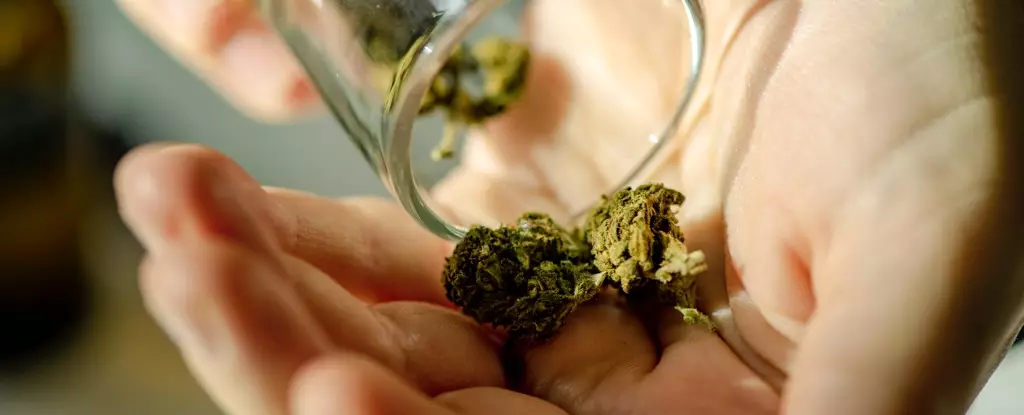Cannabis, a substance long embraced for its recreational and therapeutic effects, remains one of the most frequently utilized drugs globally. Nevertheless, the nuances of its effects, particularly concerning mental health, continue to elude researchers. Recent investigations aim to shed light on how high-potency cannabis, characterized by elevated concentrations of THC (Delta-9-tetrahydrocannabinol), relates to psychotic disorders. Understanding these relationships can be pivotal in addressing public health concerns surrounding cannabis use.
The Rise of High-Potency Cannabis
Since the 1990s, the potency of cannabis has dramatically increased, particularly in regions like the UK and US. In places such as Colorado, users can access strains boasting THC levels upwards of 90%. THC is often regarded as the key psychoactive component responsible for the euphoric “high” associated with cannabis use. While cannabis contains over 144 different compounds, the rising concentrations of THC have raised alarms among mental health professionals and researchers alike. Studies suggest that daily users of high-potency cannabis—with THC concentrations exceeding 10%—possess a drastically heightened risk for developing psychotic disorders compared to those who abstain from cannabis entirely.
Alarmingly, symptoms of psychosis can be profound and debilitating. Users might experience auditory hallucinations, wherein they hear voices that others cannot, or delusions, including feelings of persecution without justifiable proof. Paranoia often accompanies these experiences, leading to severe distress and social withdrawal.
In their quest to further comprehend the relationship between cannabis and psychosis, researchers have begun to probe deeper into molecular mechanisms, particularly focusing on DNA methylation. DNA methylation is a chemical process that regulates gene expression, influencing how genes are turned on or off. This exploration falls under the broader scientific umbrella of epigenetics, which investigates the interplay between genetics and environmental factors such as drug use and lifestyle habits.
Previous studies have touched upon the impact of cannabis on DNA methylation but have remained general in their approach, often overlooking the effects of different potencies. By analyzing daily high-potency cannabis use, researchers sought to ascertain if unique epigenetic markers could be linked to a heightened risk of psychosis in users.
The latest research embarked on a comparative analysis of two significant studies: the Genetic and Psychosis study conducted in South London, and the EU-GEI study that spanned several countries, including England, France, and Brazil. These studies gathered data from individuals experiencing their first episode of psychosis alongside a control group of healthy volunteers.
In total, the study evaluated 239 individuals undergoing their first psychotic episode against 443 participants with no known health issues. The findings illuminated that about 38% of the participants consumed cannabis more than once a week, with a notable portion using high-potency varieties consistently since their mid-teens.
The subsequent investigation into DNA methylation patterns across the genome revealed striking differences between high-potency users and non-users. Specifically, those who used high-potency cannabis exhibited alterations in DNA methylation, particularly within genes associated with energy and immune system functions.
Insights into the Psychosis Mechanism
Most compellingly, the study unveiled that the epigenetic modifications seen in cannabis users were distinct from those observed in tobacco users, a common confounder in studies about cannabis. This distinction raises critical questions about the specific pathways through which high-potency cannabis may influence the development of psychosis.
The evidence suggests that substances like cannabis can induce changes in gene activity through epigenetic mechanisms, establishing a potential connection between high-potency cannabis use and the manifestation of psychotic disorders. This insight emphasizes the importance of understanding external factors impacting biological systems, highlighting how specific lifestyle choices may exacerbate vulnerabilities in mental health.
The findings from this recent study underscore the necessity for ongoing research aimed at dissecting the biological underpinnings of cannabis use and its mental health implications. Specifically, it prompts further investigation into whether specific DNA methylation patterns might evolve into viable biomarkers for identifying individuals susceptible to developing psychosis.
Such advancements could catalyze the development of targeted prevention strategies and enhance guidelines for safer cannabis usage. As legislation increasingly leans towards legalization, a deeper comprehension of the implications regarding high-potency cannabis becomes not only desirable but essential for public health discourse.
While cannabis continues to captivate the public’s attention, the evolving understanding of its biological and psychological ramifications necessitates rigorous research and open dialogue about its potential risks, particularly in the context of high-potency varieties.


Leave a Reply